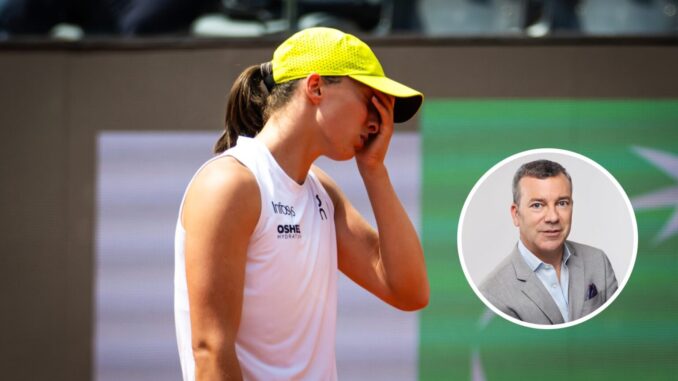
Iga Swiatek, the Polish tennis phenom who once ruled the WTA with an iron grip, is grappling with a troubling 2025 season that has left fans and analysts questioning her invincibility. The 23-year-old, a five-time Grand Slam champion and clay-court titan, has not reached a final since her triumphant 2024 French Open title defense, a drought that has sparked concern as she approaches the 2025 Roland Garros. Tennis commentator Jon Wertheim, speaking on Tennis Channel, sounded the alarm, declaring, “There is a real crisis here.” His stark assessment, delivered ahead of the Italian Open, points to a confluence of on-court struggles, coaching turmoil, and a visible erosion of Swiatek’s trademark joy, painting a complex picture of a generational talent at a crossroads.
Swiatek’s 2024 season was a masterclass in dominance, culminating in her third consecutive French Open crown and a No. 1 ranking. Yet, the past 11 months have seen her fortunes unravel. A one-month doping ban in late 2024, following a positive test for trimetazidine, disrupted her momentum, though she was cleared of intentional wrongdoing. Since then, Swiatek has failed to reclaim her spark, posting a 22-9 record in 2025 and suffering early exits in key tournaments. Her third-round loss to Danielle Collins at the Italian Open (6-1, 7-5) cost her the No. 2 ranking, with projections suggesting she could slip to No. 4 by Roland Garros—a jarring fall for a player who once seemed untouchable. “It’s not like she is losing to Sabalenka in the final 6-4 in the third,” Wertheim noted, highlighting defeats to players like Coco Gauff, Jelena Ostapenko, and Mirra Andreeva, who have “gotten her number.”
The roots of Swiatek’s struggles extend beyond match results. A coaching shake-up in October 2024 saw her part ways with longtime mentor Tomasz Wiktorowski, who guided her to four Grand Slams. Her new partnership with Wim Fissette, a seasoned coach with a resume including Naomi Osaka and Kim Clijsters, has yet to yield results. “There’s clearly some chaos in the camp,” Wertheim observed, pointing to the offseason change as a misstep. Swiatek herself acknowledged technical challenges, particularly with her serve and forehand, during the Italian Open. “I know that I haven’t been always able to implement that on the match court,” she said, admitting the short pre-season limited her ability to integrate Fissette’s adjustments. Her close bond with sports psychologist Daria Abramowicz adds another layer of complexity, with Wertheim questioning how Fissette will navigate this “complicated” dynamic.
Off the court, Swiatek’s demeanor has raised red flags. Known for her introspective nature, she has appeared burdened by stress, a stark contrast to the joy she once exuded. “She does not protect joy,” Wertheim remarked, citing social media posts and interviews where “the stress welded to her face” is palpable. Swiatek has pushed back against narratives of a mental crisis, saying, “I’m irritated by headlines talking about falling apart.” Yet, her focus on mistakes during matches, as she admitted after the Collins loss, suggests a mental battle. “I wasn’t there, present, to fight and to compete,” she confessed, vowing to regroup and refocus.
As the French Open looms, Swiatek’s 35-2 Roland Garros record and four titles make her a contender, but her current form—nine losses in 2025 matching her entire 2024 tally—casts doubt. Wertheim’s warning underscores the urgency for Swiatek to rediscover her rhythm. With rivals like Gauff, who has won their last two encounters, and Aryna Sabalenka, the reigning Australian Open champion, closing the gap, the pressure is mounting. Swiatek’s legacy as a clay-court legend is secure, but her ability to navigate this crisis will define her path forward. For now, the tennis world watches, hoping the Pole can reignite the fire that made her a champion.
Leave a Reply